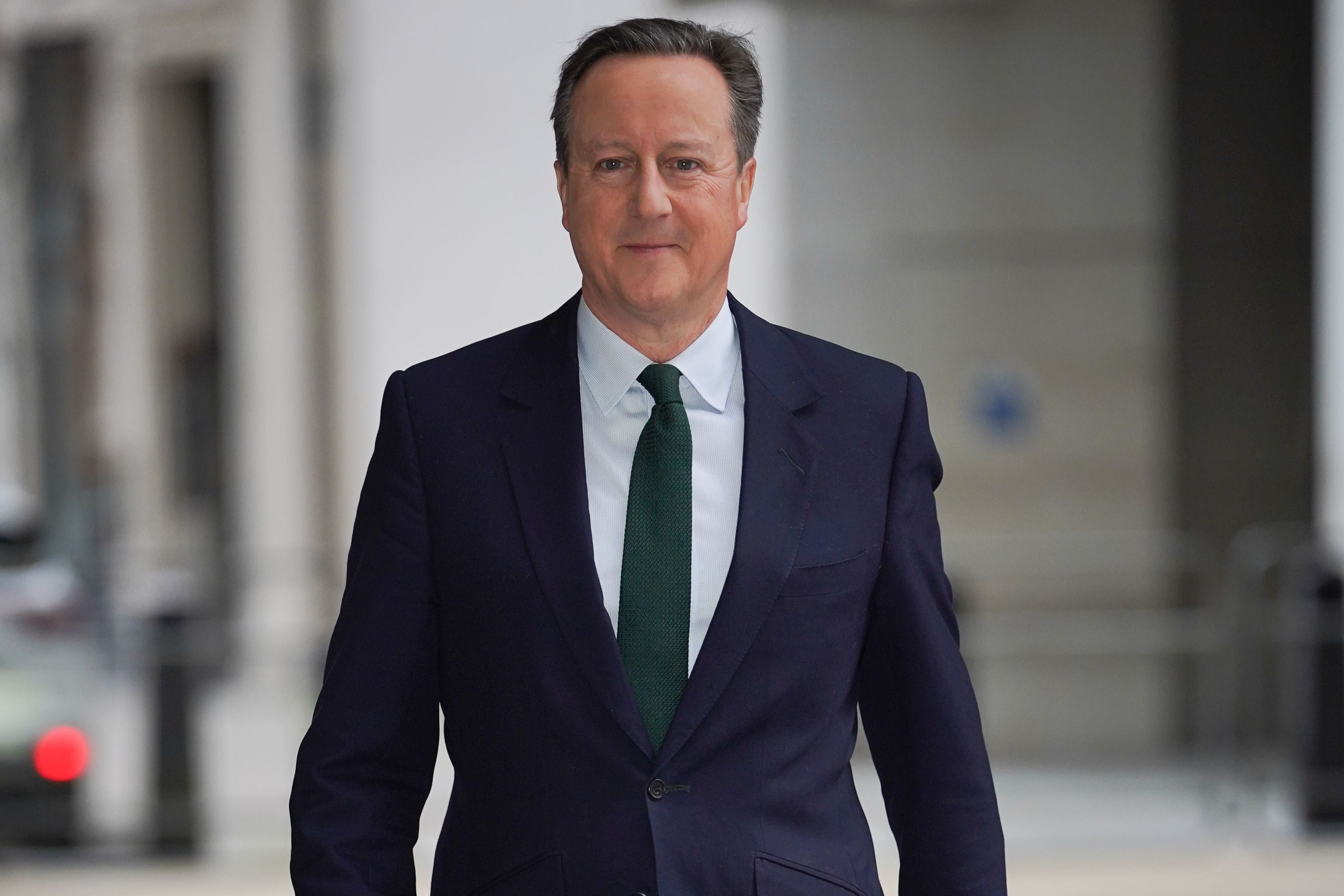Tory backlash after Cameron offers hope over UK recognition of Palestinian state
Foreign Secretary Lord Cameron raised the need to give the Palestinian people a ‘political horizon’ under efforts to end the Israeli-Hamas war.

David Cameron faced a backlash from Conservative MPs after he suggested Britain will look at recognising a Palestinian state to help end the conflict with Israel.
Foreign Secretary Lord Cameron told a London reception that the move would help to make a two-state solution – currently stalled, with Israeli Prime Minister Benjamin Netanyahu opposed to it – an “irreversible” process.
Lord Cameron discussed the need to give the “Palestinian people a political horizon” under diplomatic efforts to end the Israeli-Hamas war as he addressed a reception for Arab ambassadors in Parliament.
Will the minister agree with me that bringing forward and accelerating unilateral recognition of Palestinian state would be to reward Hamas’ atrocities?
But Conservative former cabinet minister Theresa Villiers said bringing forward the recognition of a Palestinian state would “reward Hamas’ atrocities”, while party colleague Sir Michael Ellis said the move could risk equipping “dangerous actors” with the “trimmings and capabilities of a state”.
Stephen Crabb, another Conservative former cabinet minister, described the gesture as “noble” but questioned what “talk about early recognition” of Palestinian statehood would achieve.
Foreign Office minister Andrew Mitchell insisted there has been “no change” in UK policy, while Downing Street said recognition of a Palestinian state will take place “at a time it best serves the cause of peace”.
Lord Cameron, speaking on Monday ahead of his latest visit to the Middle East, spelled out how the UK and its allies could add to pressure by considering recognising a Palestinian state at the United Nations.
“We should be starting to set out what a Palestinian state would look like – what it would comprise, how it would work,” he said.
“As that happens, we, with allies, will look at the issue of recognising a Palestinian state, including at the United Nations.
“This could be one of the things that helps to make this process irreversible.”
Speaking in the Commons on Tuesday, Ms Villiers said: “It’s really disturbing that BBC online is reporting that the Foreign Secretary has changed the UK Government’s approach on recognition of a Palestinian state.
“Will the minister agree with me that bringing forward and accelerating unilateral recognition of Palestinian state would be to reward Hamas’ atrocities?”
Mr Mitchell replied: “There is no question of rewarding Hamas for the appalling acts they perpetrated in a pogrom on October 7.
“But the point the Foreign Secretary has been making is that we must give the people of the West Bank and Gaza a credible route to a Palestine state and a new future, but we must do so when the time is right.”
Conservative former minister Sir Michael earlier said: “The Palestinian authorities’ grip on security control across the West Bank has been pushed out by the malevolent forces of Hamas and Palestinian Islamic Jihad and local terror groups funded by Iran.
“Wouldn’t unilateral recognition of Palestinian state now risk equipping those dangerous actors I just mentioned with the trimmings and capabilities of a state?”
Mr Mitchell replied: “The British Government has always made it clear we intend to recognise a Palestinian state when the timing is right.
“He will have seen the comments of the Foreign Secretary last night, which in no way deviate from that policy, but the Foreign Secretary is pointing out how important it is to ensure that people can see that when a political track gets going, real progress can be made. “
Greg Smith, Conservative MP for Buckingham, also said: “Surely the only political objective in Gaza is inextricably linked to the security objectives in Gaza, because the grim reality is that Hamas does not seek a ceasefire and Israel cannot be reasonably expected to pursue one with a group that actively seeks its destruction.”
He added: “The only political solution must be the elimination of Hamas and the release of the hostages.”
Palestinian ambassador to the UK Husam Zomlot described Lord Cameron’s words as a “significant” moment.
If implemented, the Cameron Declaration would remove Israel’s veto power over Palestinian statehood
“It is the first time a UK Foreign Secretary considers recognising the State of Palestine, bilaterally and in the UN, as a contribution to a peaceful solution rather than an outcome,” the diplomat wrote on social media.
“A UK recognition is both a Palestinian right and a British moral, political, legal, and historical responsibility.
“If implemented, the Cameron Declaration would remove Israel’s veto power over Palestinian statehood, would boost efforts toward a two-state outcome, and would begin correcting the historic injustice inflicted on the Palestinian people by colonial Britain’s Balfour declaration.”
The Prime Minister’s official spokesman said: “We’ve always been clear that we will recognise a Palestinian state at a time it best serves the cause of peace and we are committed to the two-state solution.”
Lord Cameron, whose latest trip starts in Oman, is expected to call for stability amid Houthi attacks in the Red Sea and an immediate pause in the conflict in Gaza as he looks to work diplomatically to stop the Israel-Hamas war from escalating into a wider conflict.
An attack by Iran-backed militia in Jordan over the weekend that killed three US troops and left dozens injured has stoked fresh fears of a Western confrontation with Tehran.